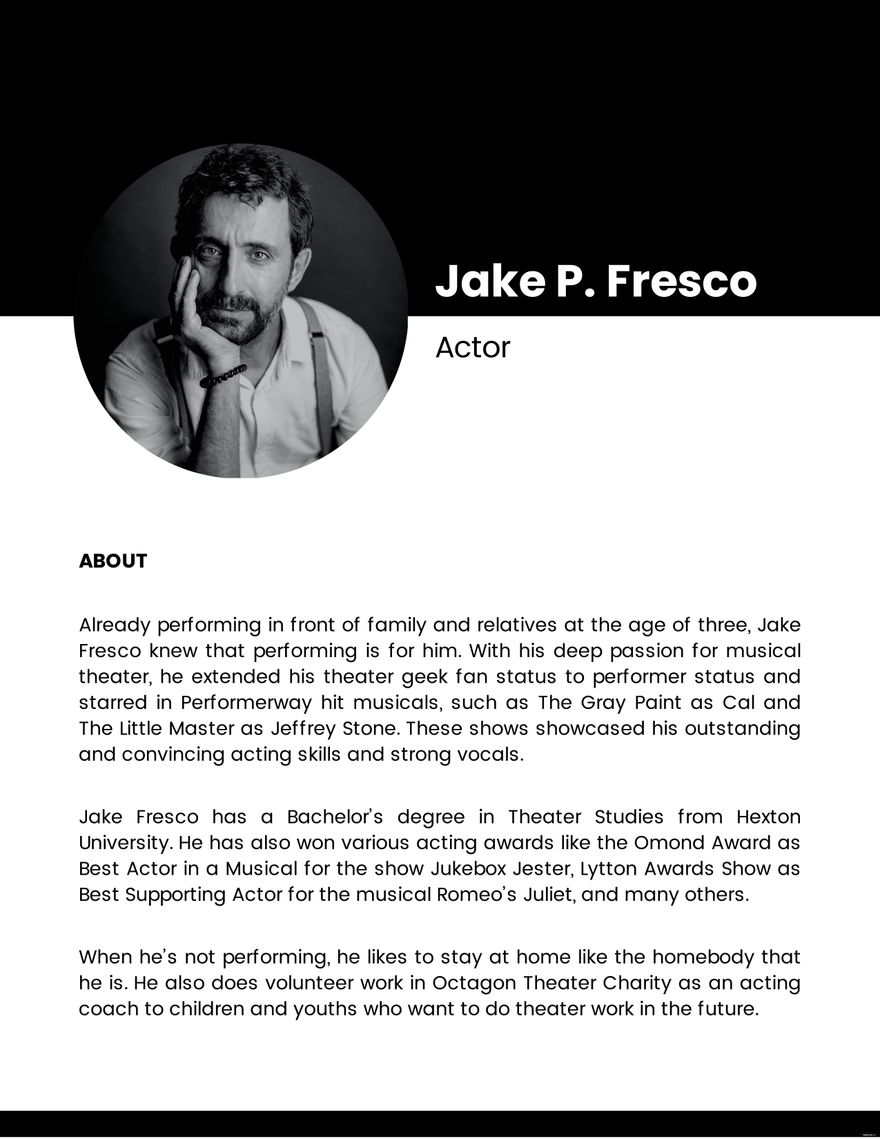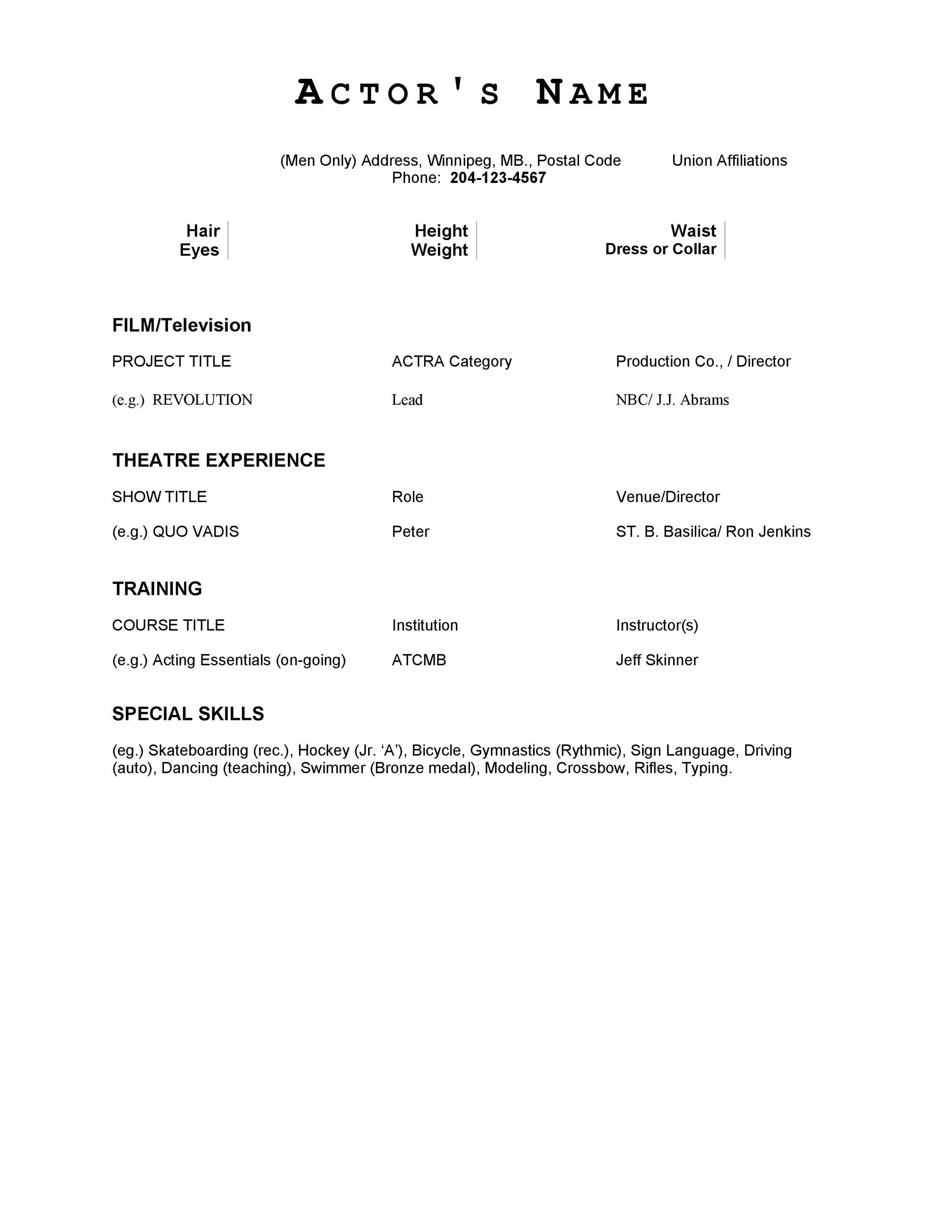Crafting The Perfect Actor Bio: Tips & Examples
Are you ready to make a lasting impression? Your actor bio is your first and often only chance to capture the attention of those who matter most: casting directors, agents, and producers.
An actor's biography, in its essence, serves as a professional introduction. It's a brief written summary encapsulating an actors career, training, noteworthy roles, and, at times, personal background. Think of it as your concise pitch, the elevator speech that can open doors. Crafting an effective bio is a skill that can significantly impact your career trajectory. Whether for an agent's website, a program, or a press release, having a well-crafted bio ready to deploy at a moment's notice is crucial in this fast-paced industry.
The landscape of the entertainment industry is competitive. Every actor vies for the same opportunities. Your bio is a pivotal tool in setting you apart. Its brevity demands precision, its purpose requires clarity, and its delivery must be compelling. You are, after all, in the business of captivating audiences, and your bio is the first act of that performance.
- Tory Lanez Fashion Style What He Wears Where To Shop It Discover Now
- Surfs Up Arcade Fun Games Pizza Near You
Consider these points: The standard actors bio may come in a variety of formats and lengths, often depending on the theater or agency's specifications. However, some guidelines remain constant. You will need to customize these examples and templates to fit your unique skills, experiences, and personality.
| Category | Details |
|---|---|
| Full Name | Michael Johnson |
| Birthdate | September 15, 1985 |
| Birthplace | London, England |
| Training | Royal Academy of Dramatic Art (RADA) |
| Notable Roles | Hamlet (Hamlet), The Phantom of the Opera (The Phantom) |
| Experience | Stage and Screen |
| Skills | Singing, Stage Combat, Dialects (British, American) |
| Personal Interests | Travel, Photography, Reading Classic Literature |
| Agent Contact | Example Agency: [Agent's Name] - [Phone Number] - [Email Address] |
| Website/Link | IMDb Profile |
To begin, consider the opening. A compelling opening is essential. Most people wouldn't know an actor by name, but they would recognize them by the role they played. The most notable role should come first, to grab attention instantly.
An actor's bio is a brief summary of an actor's career achievements and personal information, used for promotional purposes. It serves as an introduction to an actor and is often used by casting directors, agents, and producers to determine if the actor is a good fit for a particular role or project. It is important to highlight major milestones in your career.
There are two primary types of actor bios, though some might describe them differently: the short bio, perfect for programs and online profiles, and the longer bio, suitable for press releases or more detailed introductions. Both, however, must adhere to the same principles: clarity, relevance, and impact. And while the theatre or agency may specify a format and length, certain guidelines remain constant: Be concise, be accurate, and be compelling.
Consider what you want your audience to remember. Would you prefer to list every single show you've done since childhood, or a pithy paragraph that makes them chuckle? An actor's bio is the chance to engage the audience before they see you on stage or screen. Take the opportunity to share your acting background and personal information.
An actor bio is simply a summary of your career. It is guaranteed that youll never be asked until that day when youre in the middle of filming with a 4am finish time and you absolutely need to send it. Therefore, it is advisable to have one ready to send at a moments notice.
Here are some tips for writing your bio:
- Third-Person Narrative: Write in the third person. This is the standard for professional bios.
- Be Concise: Keep it brief. Casting directors and agents read many bios; brevity is your friend.
- Highlight Key Achievements: Focus on your most significant roles, training, and relevant experience.
- Show, Don't Just Tell: Use descriptive language that brings your experience to life.
- Include Personal Touches (Optional): A brief mention of your passions or interests can add a human element, but only if it's relevant.
- Stay Current: Update your bio regularly to reflect your latest work.
- Proofread: Errors can undermine your credibility. Ensure your bio is free of typos and grammatical mistakes.
- Consider your audience: Tailor your bio to the specific context. A bio for a theatre production will differ from one for a film audition.
The actor bio, on the other hand, is your story in the world of acting. Its where facts meet feelings, creating a vivid portrait of the artist. Integral components of an actor bio are a compelling opening that captures attention, highlights of major milestones in your career, and personal anecdotes or passions that shaped your journey.
Let's consider some templates as a guide. These will help you shape your bio to its best advantage.
Template 1: The Concise Bio
[Actors Name] is a [adjective] [actor type] with a passion for [genre/style]. [He/She/They] trained at [institution] and has appeared in [number] productions, including [mention notable roles]. [Actors Name] is known for [mention strengths, such as versatility, comedic timing, or dramatic depth]. [He/She/They] is represented by [Agent/Agency].
Template 2: The Detailed Bio
[Actors Name] is a [adjective] actor with a [adjective] background in [theatre/film/both]. [He/She/They] holds a [degree/qualification] from [institution] and has honed [his/her/their] craft through [training methods]. Notable roles include [list roles and productions]. [Actors Name] is recognized for [specific skills or characteristics]. [Mention any awards or accolades]. [He/She/They] is currently represented by [Agent/Agency] and is eager to continue exploring the world of acting.
Template 3: The Character-Focused Bio
[Actors Name] brings a unique [adjective] energy to every role [he/she/they] undertakes. Best known for playing [role] in [production], [he/she/they] has built a reputation for [specific skills/traits]. With training in [training background], [Actors Name] has developed a captivating stage presence. [He/She/They] brings [positive attribute] to every performance. [He/She/They] is represented by [Agent/Agency].
Note that these are templates and are meant to inspire your own unique bio, so you will want to customize them to reflect your individual skills, experiences, and personality.
When composing your biography, consider employing a second-person point of view. This approach allows you to concentrate on the primary aspects you want your audience to grasp. Make sure that the better job you do, the happier you will be with what finally appears in the programme. Be confident and transparent about your achievements and interests, and let your short bio speak for itself.
There is also a need to understand how an actor's bio differs from a resume. The resume provides a detailed list of credits and training, while the bio offers a narrative. The bio gives a quick overview of an actor's career. The resume is a list, the bio is a story.
However, in the real world of acting, things dont always go as expected. Consider how theaters manipulate an actor's bio to their own desires. They dictate the number of words. The question here is: when can a theater demand that an actor follow their style guide?
Beyond the content, the format of your bio is also important. While the specific requirements may vary, here are some general guidelines to follow:
- Length: Keep it concise, ideally under 200 words, although this can vary based on the context.
- Font: Use a professional and easy-to-read font, such as Times New Roman or Arial.
- Font Size: Aim for a readable size, such as 11 or 12 points.
- Formatting: Ensure proper spacing and paragraphing. Avoid overly stylized fonts or excessive formatting.
In this industry, you need to showcase your adaptability across various roles. Your actor bio is a key tool. A great bio is a concise and compelling introduction to who you are as an actor, but also the genre's you can act. In this way, you can make the industry completely aware of what parts you will be able to perform.
Consider the advice from backstage.com: a bio is a summary of the highlights of your careeryour training, credits, and something about you personally, i.e., what you do when you are not acting. It tells the industry in sentence formunlike the columns in your resumewhat genres you can voice and why to hire you.
- Carol Petersen Expert In Bhrt Hormone Therapy Insights
- Unfortunate Events Box Set Find Shop Now Netflix Series

Professional Bio Template For Actor in Word Download Template

Theatre Bio Template

50 FREE Acting Resume Templates (Word & Google Docs) ᐅ TemplateLab